What do Germany, Florida, and Brazil have in common? Possibly, many things, but one of the most important ones is a future air mobility network that will enable high-speed, quiet, emission-free flights. Munich-based Lilium has managed to establish future routes in all of these three countries for its electric jet.
Lilium had announced 14 locations in Florida for its future air mobility network and a recent partnership with Brazilian airline Azul and is now adding another strategic hub to its planned network in Germany. The aviation company has planned electric-flight hubs in the western part of the country, at the Cologne/Bonn and Dusseldorf airports, as well as in the southern region, at Munich and Nuremberg. Stuttgart represents the latest addition to this route.
Besides developing an electric vertical take-off and landing jet (eVTOL), Lilium has also conducted several studies regarding locations, infrastructure, and airspace integration in the past years. The goal of these extended networks in Germany is to offer fully-electric connections that will allow passengers in each region to travel fast and comfortably, at prices similar to those of conventional means of transport.
Thanks to the latest addition, the Lilium jet will connect passengers from Stuttgart, Munich, and Nuremberg, with the nearby cities and regions.
The project is also encouraged by the regional authorities, who are committed to supporting innovative programs for air mobility. Dr. Florian Stegmann, Minister of State and Head of the State Chancellery of the State of Baden-Württemberg, announced that the Bavarian State Government intends to invest over $100 million (€100 million) in research and development programs related to urban air mobility, in the next years.
The Lilium Jet, an eVTOL with a 155-mile (125 km) range, and 175 mph (280 kph) cruise speed, is currently in the process of being certified by the European Aviation Safety Agency (EASA) and the Federal Aviation Administration (FAA). The electric flight operations are set to kick off in 2024.
Besides developing an electric vertical take-off and landing jet (eVTOL), Lilium has also conducted several studies regarding locations, infrastructure, and airspace integration in the past years. The goal of these extended networks in Germany is to offer fully-electric connections that will allow passengers in each region to travel fast and comfortably, at prices similar to those of conventional means of transport.
Thanks to the latest addition, the Lilium jet will connect passengers from Stuttgart, Munich, and Nuremberg, with the nearby cities and regions.
The project is also encouraged by the regional authorities, who are committed to supporting innovative programs for air mobility. Dr. Florian Stegmann, Minister of State and Head of the State Chancellery of the State of Baden-Württemberg, announced that the Bavarian State Government intends to invest over $100 million (€100 million) in research and development programs related to urban air mobility, in the next years.
The Lilium Jet, an eVTOL with a 155-mile (125 km) range, and 175 mph (280 kph) cruise speed, is currently in the process of being certified by the European Aviation Safety Agency (EASA) and the Federal Aviation Administration (FAA). The electric flight operations are set to kick off in 2024.
Next stop: Stuttgart Airport ?????? Excited to add @STR_Airport as a hub for our planned southern German network, which will offer fully electric, ultra-quiet and fast regional connections.
— Lilium (@Lilium) October 29, 2021
Read more here: https://t.co/QPZiZJKCI2 pic.twitter.com/jfMCRWm71w






